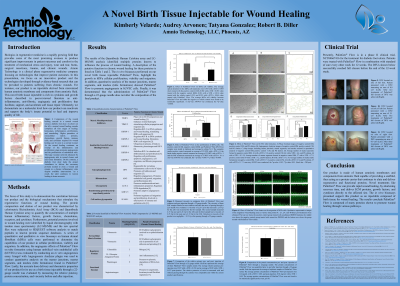Clinical Research
(CR-035) A Novel Birth Tissue Injectable for Wound Healing

Audrey Arvonen, B.S. – Research Scientist III, Amnio Technology; Tatyana Gonzalez, B.S. – Laboratory Technician, Amnio Technology; Robert Diller, Ph.D. – Sr. Dir. of New Product Development, Amnio Technology
Introduction: Biologics in regenerative medicine is a rapidly growing field that provides some of the most promising avenues to produce significant improvements in patient outcomes and comfort in the treatment of mechanical stress and injury, wear and tear, burns, surgical resections, trauma, and chronic wounds. Amnio Technology is a clinical phase regenerative medicine company focusing on technologies that improve patient outcomes. In this presentation, we focus on an innovative product and the technologies developed through evidence-based research that can be provided to patients suffering from chronic wounds. For instance, our product is an injectable derived from micronized human amniotic membranes and components from amniotic fluid. This novel birth tissue injectable is rich in cytokines and growth factors described in peer-reviewed literature as anti-inflammatory, anti-fibrotic, angiogenic and proliferative that facilitate, support, and accelerate soft tissue repair. Ultimately, we demonstrate on a molecular level how our product can reactivate and support the body’s innate potential to heal and improve quality of life.
Methods: The focus of this study is to demonstrate the correlation between our product and the biological mechanisms that stimulate the regenerative functions of wound healing. A series of in vitro bioassays on human dermal fibroblast (HDFa) cells were performed to determine the capabilities of our product in cellular proliferation and migration. Protein composition and elution of our product was characterized by Quantibody Human Cytokine Array and Bicinchoninic Acid Array. In addition to these tests, the accurate dose delivery and rheometric properties of our product for its use as a birth tissue injectable through a 22-gauge needle was evaluated by measuring the relative potency, protein concentration, and viscosity before and after injection.
Results: The results of the in vitro bioassays performed on our birth tissue injectable highlight the growth in cellular proliferation and migration. We were able to characterize and quantify multiple proteins known to influence wound healing. Finally, we demonstrated efficacy in the administration of our product through a 22-gauge needle.
Discussion: Our product is made of human amniotic membranes and components from amniotic fluid capable of providing a scaffold, thus acting as a protein carrier that continues to elute and deliver regenerative and functional proteins for continuous days. The in vitro bioassays presented support this product as an injectable composed of birth tissue product for wound healing. This product is currently in a phase II clinical trial, NCT04667416.
Trademarked Items:
References:
Methods: The focus of this study is to demonstrate the correlation between our product and the biological mechanisms that stimulate the regenerative functions of wound healing. A series of in vitro bioassays on human dermal fibroblast (HDFa) cells were performed to determine the capabilities of our product in cellular proliferation and migration. Protein composition and elution of our product was characterized by Quantibody Human Cytokine Array and Bicinchoninic Acid Array. In addition to these tests, the accurate dose delivery and rheometric properties of our product for its use as a birth tissue injectable through a 22-gauge needle was evaluated by measuring the relative potency, protein concentration, and viscosity before and after injection.
Results: The results of the in vitro bioassays performed on our birth tissue injectable highlight the growth in cellular proliferation and migration. We were able to characterize and quantify multiple proteins known to influence wound healing. Finally, we demonstrated efficacy in the administration of our product through a 22-gauge needle.
Discussion: Our product is made of human amniotic membranes and components from amniotic fluid capable of providing a scaffold, thus acting as a protein carrier that continues to elute and deliver regenerative and functional proteins for continuous days. The in vitro bioassays presented support this product as an injectable composed of birth tissue product for wound healing. This product is currently in a phase II clinical trial, NCT04667416.
Trademarked Items:
References:

.png)